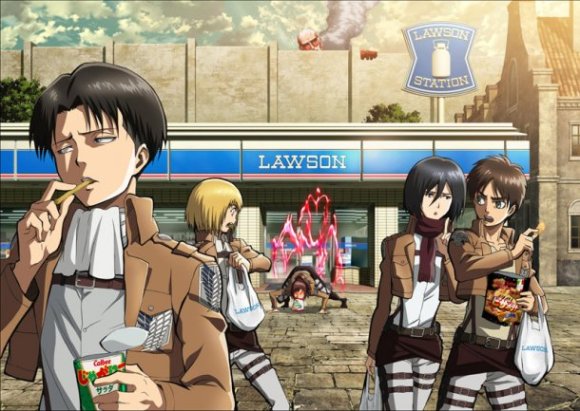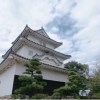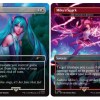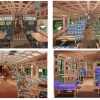It’s been a long time since anime has had a hit like Attack on Titan. Over the last several years, Japanese animation has become increasingly self-referential, providing previously unparalleled enjoyment for, and arguably pandering to, its most devoted followers. This came at the cost of accessibility, though, and often shut out new fans in much the same way that the city walls in Attack on Titan were keep rampaging giants outside the city.
Joji Wada (who also goes by George Wada), is the head of Wit Studio, the production house behind the animated hit. In a recent interview with the The Nikkei, Wada talked about the keys to Attack on Titan’s success, as well as dropped some tantalizing hints regarding spin-offs and sequels.
Not so long ago, anime was distributed internationally exclusively on home video, which meant a lengthy lag between when viewers in Japan and elsewhere would watch a show. Most current anime with overseas appeal, though, is streamed online, which has allowed Attack on Titan to resonate simultaneously with fans located around the globe. “Last year, I attended anime festivals in the U.S., U.K., and Singapore,” the 35-year-old Wada recalls, “and I was surprised by how many young people I saw doing Attack on Titan cosplay.”
The show’s international success is certainly a happy development for Wit Studio, but the animation staff didn’t necessarily set out with that as its goal, and instead went with the choices that they, as people born and raised in Japan, felt would be interesting or entertaining. Wada does acknowledge that the team’s subconscious influences may have been at play, though. “Since we were kids, we’ve naturally consumed a lot of American entertainment, and I think part of the show’s global international acceptance comes from reflecting those sensibilities through a uniquely Japanese prism.”
Wada did recognize early on, however, that Attack on Titan’s central themes are universally relatable, particularly its protagonist’s desire to see the world outside his town’s multiple layers of protective walls, even if that means exposing himself to the danger presented by the colossal, man-eating giants his society lives in fear of. Wada likens this to Japanese youths graduating from college and leaving the secure cocoon of their student lives, or the international businessman who is presented with both the wide open possibilities and threats from limitless competitors in the global marketplace.
▼ Multinational CEOs do slightly less decapitating of 60-meter tall monsters than Attack on Titan’s Scout Corps, however.
Wada himself could relate to the characters on a personal level. Wit Studio is less than two years old, with most of its staff being former members of Production I.G (the studio behind Ghost in the Shell, Eden of the East, and Moribito). Attack on Titan is only Wit Studio’s second project, and its first TV series, so Wada is well aware of the mix of temerity and trepidation that comes with heading off into the unknown.
As could be expected, the studio encountered some hiccups with its first serialized anime, with the animators often spending consecutive nights at the office as they worked to bump up the quality of the show’s visuals, which early on received less than glowing reviews. One night, while slaving away during a typhoon, the power suddenly went out, which presented a problem.
The team made extensive use of digital effects in crafting Attack on Titan’s iconic scenes of its heroes zipping through the air using their three dimensional maneuver gear. No electricity meant no computers though, and one of the animators, having time on his hands, tweeted the studio’s predicament using his smartphone. Almost immediately, fans tweeted back, saying “Come back on, power!” A few hours later, when electricity was restored, Wada was relieved to find that no data had been lost. “I really felt like this is an anime we all made together, even the fans.”
▼ Someone get this guy an associate producer credit, while we’re at it.
So, given the not entirely conclusive way in which Attack on Titan’s TV run ended last September, can we expect to see more of our titan-slaying heroes? Definitely, and if Wada has his way, we’ll get a generous helping.
“The manga comic the anime is based on is still ongoing, and all of us on the staff are following and loving it,” the studio head gushed. “Eventually, we definitely want to do a sequel. This year, though, we’ve got our hands full producing an anime that will be bundled in a limited edition of the Attack on Titan manga, which tells a different sort of story than what we did in the TV series.”
So just be patient, everybody. The Scout Corps will be back soon enough.
▼ After all, everybody needs a little break now and again.
Sources: Nihon Keizai Shimbun, FC2
Insert image: Natalie


 60-meter Attack on Titan monster comes to Kawasaki, so we do too 【Photos】
60-meter Attack on Titan monster comes to Kawasaki, so we do too 【Photos】 Life-size Attack on Titan monster to appear in projection-mapped form in Kawasaki
Life-size Attack on Titan monster to appear in projection-mapped form in Kawasaki Finally! Attack on Titan director says TV anime’s second season will start production in 2016
Finally! Attack on Titan director says TV anime’s second season will start production in 2016 Attack on Thanksgiving! First animated Attack on Titan movie to open in November
Attack on Thanksgiving! First animated Attack on Titan movie to open in November Titans attack Lawson convenience stores, bring tons of anime goodies with them
Titans attack Lawson convenience stores, bring tons of anime goodies with them Foreigner’s request for help in Tokyo makes us sad for the state of society
Foreigner’s request for help in Tokyo makes us sad for the state of society McDonald’s Japan’s new pancake pie is a taste sensation
McDonald’s Japan’s new pancake pie is a taste sensation Studio Ghibli unveils massive T-shirt collection featuring top anime movie characters
Studio Ghibli unveils massive T-shirt collection featuring top anime movie characters Bad tourist manners at Mt Fuji Lawson photo spot prompts Japanese town to block view with screens
Bad tourist manners at Mt Fuji Lawson photo spot prompts Japanese town to block view with screens One of Japan’s oldest castles now lets travelers spend night on the grounds, drink in its keep
One of Japan’s oldest castles now lets travelers spend night on the grounds, drink in its keep Who wins in a battle of McDonald’s and Komeda Coffee’s chicken tatsuta burgers?【Taste test】
Who wins in a battle of McDonald’s and Komeda Coffee’s chicken tatsuta burgers?【Taste test】 Yakuza lieutenant arrested in Tokyo for stealing Pokémon cards
Yakuza lieutenant arrested in Tokyo for stealing Pokémon cards Hatsune Miku comes to Magic: The Gathering with official crossover cards【Photos/Video】
Hatsune Miku comes to Magic: The Gathering with official crossover cards【Photos/Video】 FUK COFFEE?!? Japanese cafe has a perfectly innocent reason for its startling-looking name
FUK COFFEE?!? Japanese cafe has a perfectly innocent reason for its startling-looking name Two things to do, and two things not to do, when leaving a traditional Japanese inn
Two things to do, and two things not to do, when leaving a traditional Japanese inn Japanese ramen restaurants under pressure from new yen banknotes
Japanese ramen restaurants under pressure from new yen banknotes Red light district sushi restaurant in Tokyo shows us just how wrong we were about it
Red light district sushi restaurant in Tokyo shows us just how wrong we were about it McDonald’s new Happy Meals offer up cute and practical Sanrio lifestyle goods
McDonald’s new Happy Meals offer up cute and practical Sanrio lifestyle goods Tokyo Tsukiji fish market site to be redeveloped with 50,000-seat stadium, hotel, shopping center
Tokyo Tsukiji fish market site to be redeveloped with 50,000-seat stadium, hotel, shopping center Japanese city loses residents’ personal data, which was on paper being transported on a windy day
Japanese city loses residents’ personal data, which was on paper being transported on a windy day Beautiful Red and Blue Star luxury trains set to be Japan’s new Hokkaido travel stars
Beautiful Red and Blue Star luxury trains set to be Japan’s new Hokkaido travel stars Ghibli Park now selling “Grilled Frogs” from food cart in Valley of Witches
Ghibli Park now selling “Grilled Frogs” from food cart in Valley of Witches New definition of “Japanese whiskey” goes into effect to prevent fakes from fooling overseas buyers
New definition of “Japanese whiskey” goes into effect to prevent fakes from fooling overseas buyers Our Japanese reporter visits Costco in the U.S., finds super American and very Japanese things
Our Japanese reporter visits Costco in the U.S., finds super American and very Japanese things All-you-can-drink Starbucks and amazing views part of Tokyo’s new 170 meter-high sky lounge
All-you-can-drink Starbucks and amazing views part of Tokyo’s new 170 meter-high sky lounge More foreign tourists than ever before in history visited Japan last month
More foreign tourists than ever before in history visited Japan last month New Pokémon cakes let you eat your way through Pikachu and all the Eevee evolutions
New Pokémon cakes let you eat your way through Pikachu and all the Eevee evolutions Disney princesses get official manga makeovers for Manga Princess Cafe opening in Tokyo
Disney princesses get official manga makeovers for Manga Princess Cafe opening in Tokyo We try out “Chan Ramen”, an underground type of ramen popular in the ramen community
We try out “Chan Ramen”, an underground type of ramen popular in the ramen community Sales of Japan’s most convenient train ticket/shopping payment cards suspended indefinitely
Sales of Japan’s most convenient train ticket/shopping payment cards suspended indefinitely Sold-out Studio Ghibli desktop humidifiers are back so Totoro can help you through the dry season
Sold-out Studio Ghibli desktop humidifiers are back so Totoro can help you through the dry season Japanese government to make first change to romanization spelling rules since the 1950s
Japanese government to make first change to romanization spelling rules since the 1950s Ghibli founders Toshio Suzuki and Hayao Miyazaki contribute to Japanese whisky Totoro label design
Ghibli founders Toshio Suzuki and Hayao Miyazaki contribute to Japanese whisky Totoro label design Doraemon found buried at sea as scene from 1993 anime becomes real life【Photos】
Doraemon found buried at sea as scene from 1993 anime becomes real life【Photos】 Tokyo’s most famous Starbucks is closed
Tokyo’s most famous Starbucks is closed One Piece characters’ nationalities revealed, but fans have mixed opinions
One Piece characters’ nationalities revealed, but fans have mixed opinions We asked a Uniqlo employee what four things we should buy and their suggestions didn’t disappoint
We asked a Uniqlo employee what four things we should buy and their suggestions didn’t disappoint Live-action Attack on Titan posters show new characters and weapons, plus one huge absence
Live-action Attack on Titan posters show new characters and weapons, plus one huge absence Japanese drama set in New York is your next binge-watch series
Japanese drama set in New York is your next binge-watch series Attack on Titan bag and shawl let you gear up for fighting giants, fashionable dates
Attack on Titan bag and shawl let you gear up for fighting giants, fashionable dates Attack on Titan anime’s second season’s start month leaked ahead of new manga release
Attack on Titan anime’s second season’s start month leaked ahead of new manga release Digimon staff give skating champion Yuzuru Hanyu a present he would not likely soon forget
Digimon staff give skating champion Yuzuru Hanyu a present he would not likely soon forget Scout Corps now accepting recruits for upcoming Attack on Titan Real Escape Games
Scout Corps now accepting recruits for upcoming Attack on Titan Real Escape Games Tokyo now has a photo-op Attack on Titan ATM in one of its biggest anime shopping centers
Tokyo now has a photo-op Attack on Titan ATM in one of its biggest anime shopping centers Yoshinoya beef ramen? Gyudon king’s sister chain opens first Tokyo branch【Taste test】
Yoshinoya beef ramen? Gyudon king’s sister chain opens first Tokyo branch【Taste test】 Giant-sized Dragon Ball sculpture created for Sapporo Snow Festival 【Photos】
Giant-sized Dragon Ball sculpture created for Sapporo Snow Festival 【Photos】 Attack on Titan’s final, series-ending scene revealed by franchise creator
Attack on Titan’s final, series-ending scene revealed by franchise creator What would J-rock legend Yoshiki look like as an Attack on Titan giant? Like this【Video】
What would J-rock legend Yoshiki look like as an Attack on Titan giant? Like this【Video】 New four-way Attack on Titan Vertical Maneuvering bags are massively stylish and functional
New four-way Attack on Titan Vertical Maneuvering bags are massively stylish and functional Attack on Titan’s Universal Studios Japan attraction opens
Attack on Titan’s Universal Studios Japan attraction opens
Leave a Reply